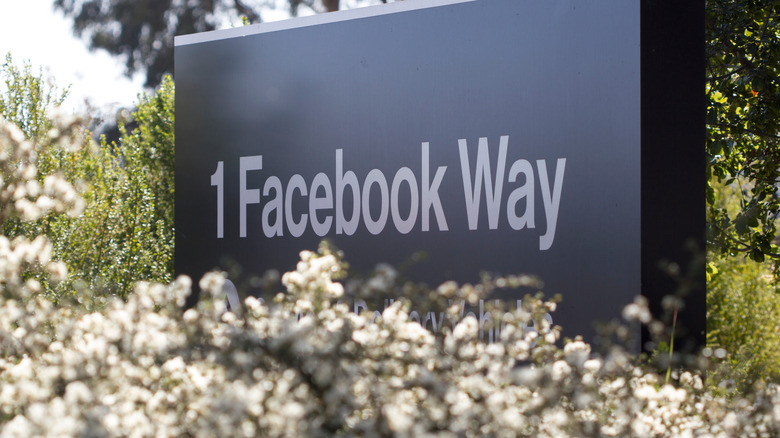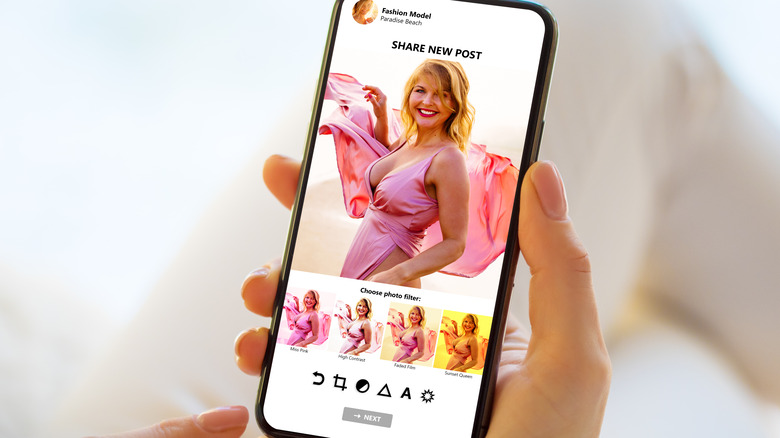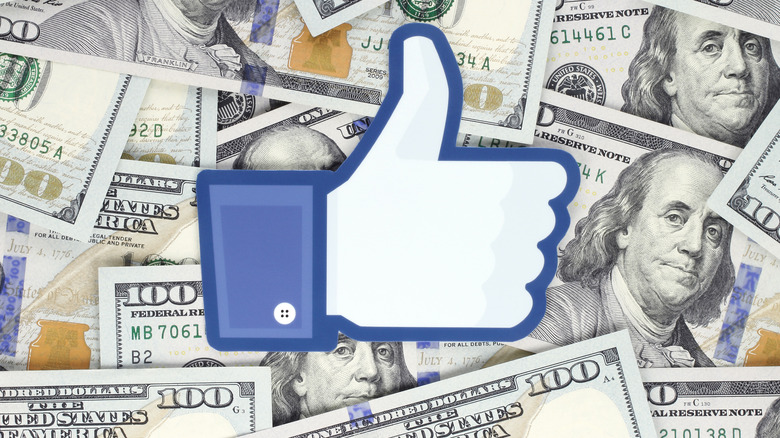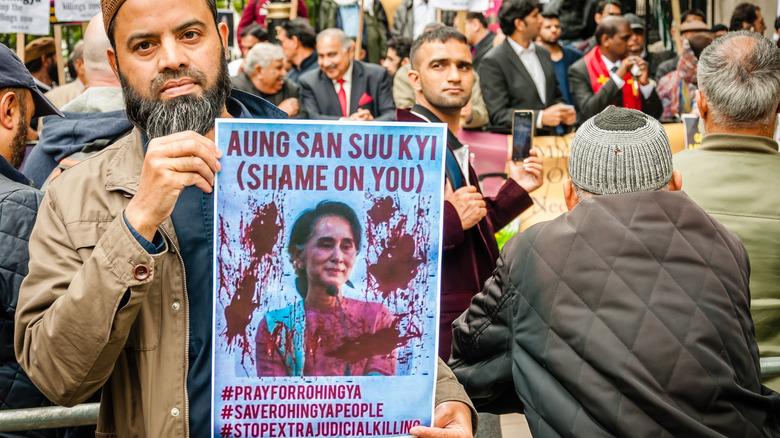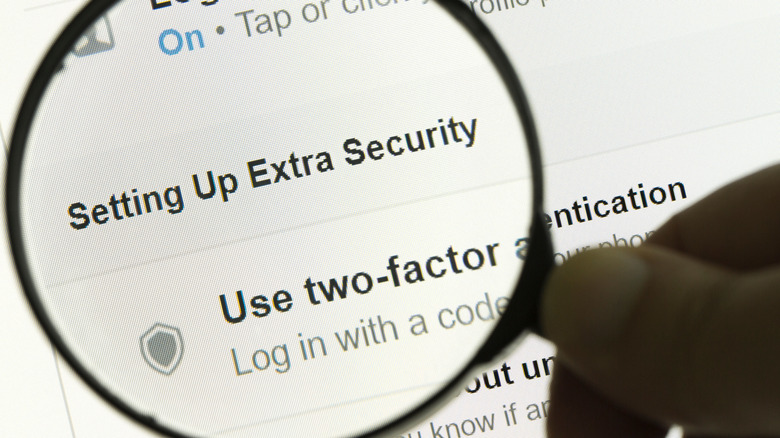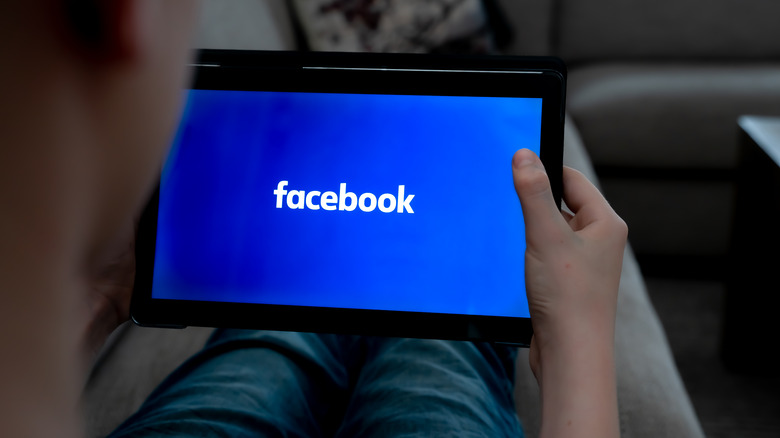Messed Up Things We Learned From The Facebook Whistleblower
In the last few years, social media giant Facebook has been marred with a lot of controversy. And they're not just minuscule conflicts, either — Facebook is a common denominator in a lot of social media-related controversies that span the globe. The company's founder and CEO Mark Zuckerberg has even had to make multiple trips to Washington, D.C., just to answer for his company at various congressional hearings. If it's not an alleged privacy breach, spreading misinformation, or censorship claims, it's issues with allegedly interfering with presidential elections and tracking or selling personal data. But clearly there's a lot more.
Now the company has a whistleblower on its hands. On October 4, Facebook and other social platforms the company owns, Instagram and WhatsApp, were down. It was a massive outage, which coincidently came several hours after an anonymous whistleblower, now revealed to be Frances Haugen, shared her identity on the televised program, "60 Minutes" (via CBS News). Last month, several damning documents were leaked, which showed the company knows of its role on the internet and the harm it causes, per The Wall Street Journal. It was Haugen who copied and released Facebook's findings to the outlet. She has effectively blown the lid off by exposing multiple errors that the company is aware of but failing to act on.
Facebook's Instagram platform may harm young girls
One of the very first pieces of information exposed was the company's research on whether its photo-sharing platform, Instagram, harms the mental health of young girls. Zuckerberg has stated, and even testified, that any detrimental effects caused by his websites couldn't be further from the truth. However, thanks to Haugen's leak, we now know that Zuckerberg was purportedly lying the whole time. According to leaked research documents, in its own investigation, Facebook found that Instagram had an impacted on self-image and mental health issues (via The Guardian).
The site has always been under staunch criticism due to its picture filters and the link with causing body issues in teen girls, per Women's Health Magazine. The ability to change your appearance with face-altering photo effects can cause a variety of self-image problems, per Forbes. Reportedly, the company has not acted on the findings or presented a solution to the problem, in addition to Zuckerberg supposedly denying it. But Haugen says Facebook is quite unique in that its negative effects. "Facebook's own research says it is not just the Instagram is dangerous for teenagers, that it harms teenagers, it's that it is distinctly worse than other forms of social media," she said.
Green is the only thing Facebook supposedly sees
The company purportedly prioritizes money over integrity. In her interview with "60 Minutes," Haugen said that during her time with Facebook, she observed that its business model was flawed — it put money first above everything — even when they knew certain information on the website was unsafe for users.
The content posted and shared on Facebook has always been the source of a lot of criticism, and despite an extensive user policy, a lot of things still make it through. However, even with a team dedicated to removing posts that violate the policy, Facebook reportedly made several exceptions. When the company saw something as a money-making opportunity, even if it was wrong, they seemingly overlooked it. "The thing I saw at Facebook over and over again was there were conflicts of interest between what was good for the public and what was good for Facebook. And Facebook, over and over again, chose to optimize for its own interests, like making more money," Haugen said (via CBS News).
The common denominator in a genocide
The use of the website was purportedly facilitated by a brutal military in Myanmar. The armed forces of the Southeast Asian country reportedly used Facebook to spread violent and hateful messages about Rohingya minorities in the country. As a result, there's been a mass killing and fleeing of the Rohingyas from Myanmar. An estimated 730,000 have migrated to other countries, and some 10,000 have been killed (via The Conversation).
No other social media site was accused of playing a major role in the genocide other than Facebook. In 2019, the company even said that it failed to stop the use of it to promote the deadly mass murder, per The Diplomat. But Facebook was (and is) seemingly aware of what some use the website for, particularly that of hate speech. "When we live in an information environment that is full of angry, hateful, polarizing content it erodes our civic trust, it erodes our faith in each other, it erodes our ability to want to care for each other, the version of Facebook that exists today is tearing our societies apart and causing ethnic violence around the world," said Haugen (via CBS News).
Facebook may have disabled safety measures for engagement
During past election seasons, there was likely a lot of misinformation shared on Facebook. The company saw this and implemented an alleged business model of banking on the attention these posts received as opposed to removal. Not only that, but they were also reportedly aware that the angrier posts sowing division had a draw — a draw that encouraged more and more engagement and users to interact with. Evidently, this is information the company always knew.
When the 2020 election came around, Facebook acted on the issue by setting new safety measures. Yet, according to Haugen, it was all for show, and the company disabled the measures shortly after the election came to an end. "And as soon as the election was over, they turned them back off, or they changed the settings back to what they were before, to prioritize growth over safety. And that really feels like a betrayal of democracy to me," Haugen said (via CBS News).
Facebook might be the worst social media platform
According to Haugen, whose resume boasts working for other major social media websites such as Pinterest and Google, Facebook stands alone in being the worst platform (via CBS News). She worked at the company for two years and left this past May, leaking thousands of documents to The Wall Street Journal in September. Haugen said the social media platform operates too many conflicting policies that disagree with its purported mission. Every single social media site has faced its fair share of criticism for playing a part in negatively affecting social interaction, creating insecurities, and the likes of promoting inappropriate content. Despite that fact, Facebook seems to be in its own lane. "I've seen a bunch of social networks, and it was substantially worse at Facebook than anything I'd seen before," said Haugen.
She stated that other sites have a wide-range and a limit of content, whereas Facebook has specifically curated content that will inundate its user. "So, you know, you have your phone. You might see only 100 pieces of content if you sit and scroll on for, you know, five minutes. But Facebook has thousands of options it could show you," she said.
